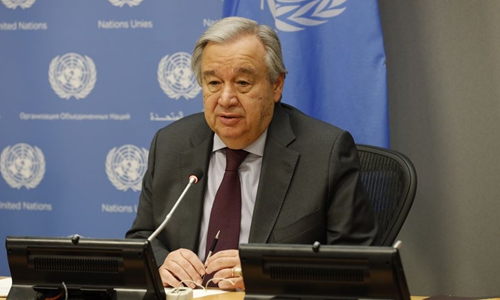Last seven years on track to be hottest ever recorded: WMO report

United Nations Secretary-General Antonio Guterres speaks at the launch of the World Meteorological Organization (WMO) Statement on the State of the Global Climate in 2019, at the UN headquarters in New York, on March 10, 2020. (Xinhua/Xie E)
The years from 2015 to 2021 are on track to be the seven hottest on record, the World Meteorological Organization (WMO) said on Sunday, warning that the planet was heading into "uncharted territory."The preliminary WMO state of the climate report, launched as the UN COP26 climate conference opens, said that global warming from greenhouse gas emissions threatens "far-reaching repercussions for current and future generations."
Based on data for the first nine months of 2021, the WMO said 2021 was likely to be between the fifth and seventh warmest year on record - despite the cooling effect of the La Nina phenomenon that lowered temperatures at the beginning of 2021.
"From the ocean depths to mountain tops, from melting glaciers to relentless extreme weather events, ecosystems and communities around the globe are being devastated," said United Nations Secretary-General Antonio Guterres in a statement on the report.
He added that the two-week COP26 climate conference "must be a turning point for people and planet."
The WMO found that the average temperature for 2021 was around 1.09 C higher than pre-industrial levels.
And the average temperature over the last 20 years for the first time exceeded the threshold of 1 C above the mid-19th century, when humans began burning fossil fuels on an industrial scale.
This will "focus the minds of delegates at COP26 aspiring to keep global temperature rise to within the limits agreed in Paris six years ago," said Stephen Belcher, chief scientist at Britain's Met Office.
The 2015 Paris Agreement saw countries agree to cap global warming at "well below" 2 C above pre-industrial levels, and 1.5 C if possible.
Since then the world has seen a litany of weather disasters including record-shattering wildfires across Australia and Siberia, a once-in-a-thousand-years heat wave in North America and extreme rainfall that caused massive flooding in Asia, Africa, the US and Europe.
"Extreme events are the new norm," said WMO Secretary-General Petteri Taalas.
AFP
